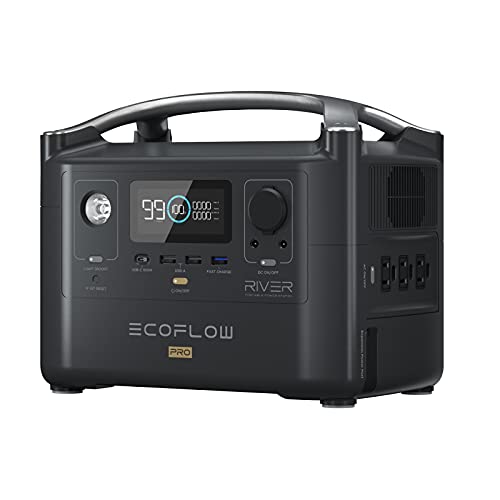When it comes to portable power solutions, outdoor enthusiasts, remote workers, and emergency preparedness advocates want the best bang for their buck. In this article, we’ll dive deep into the details, comparing the Jackery 300 Plus and the EcoFlow River Pro, to help you decide which portable power station will best suit your needs.
Portable Power Stations: At a Glance
| Feature | Jackery 300 Plus | EcoFlow River Pro |
|---|---|---|
| Weight | 8.27 lbs | 16.8 lbs |
| Capacity | 288Wh | 720Wh |
| Output | 300W | 600W (Surge 1200W) |
| Expandable Capacity | No | Yes (up to 1440Wh) |
| Charge Time | 2-9.5 hours | 1-1.6 hours |
| Cycle Life | Decades of usage with proper care (when recharged every three days) | 800+ cycles to 80%+ capacity |
| Output Ports | Multiple, including USB-C and AC | Multiple, including AC, USB-C, USB-A |
| Charging Methods | Solar, Wall, Car, USB | Solar, AC, Car |
| Warranty | 3+2 years | 24 months |
Weight and Portability
Portability is key in a portable power station. The Jackery 300 Plus wins in this category weighing only 8.27 lbs, almost half the weight of the EcoFlow River Pro at 16.8 lbs. If you’re looking to trek into the wilderness with gear, each pound matters.
Battery Capacity and Output
Comparing power capacity, the EcoFlow River Pro leads with a robust 720Wh over the Jackery’s 288Wh. When it comes to output, EcoFlow offers 600W with the ability to surge to 1200W, making it more suitable for high power-demand scenarios, while the Jackery limits to a steady 300W output.
Expansion and Flexibility
For those who need to power more devices or extend backup time, the EcoFlow River Pro’s capacity can be doubled with an extra battery. Unfortunately, the Jackery 300 Plus doesn’t have an expansion feature.
Charging Efficiency
When it comes to charging time, the EcoFlow River Pro’s X-Stream Fast Charging tech is impressive, with 0-80% charge in 1 hour. Meanwhile, the Jackery takes a minimum of 2.8 hours to charge via USB.
Lifespan and Sustainability
Jackery boasts a long-lasting battery life, with the potential to last up to 10 years based on charging every three days. The EcoFlow, while not as durable in lifespan, still offers a solid 800+ cycles to 80% capacity.
Port Options & Usability
Both devices offer a plethora of ports, but with slight differences. The Jackery focuses on the newer type of devices with its 100W USB-C ports, while the EcoFlow covers a wider range with its variety of ports, including USB-A fast charge and an extra car outlet.
Charging Methods
Both brands offer solar panel charging as an option, promoting greener charging solutions. They also provide traditional wall and car charging options, but the Jackery additionally caters to the digital age with USB charging.
Safety and Certifications
Safety-wise, the Jackery’s FCC/CE certification and various protective mechanisms provide peace of mind. The EcoFlow doesn’t skimp on safety either, promising secure operations across devices.
Warranty and Customer Service
Jackery stands out with its unparalleled 3+2 year warranty, indicating confidence in their product’s longevity. EcoFlow offers a reputable 24-month warranty, ensuring adequate coverage for users.
Wrapping Up the Comparison
In conclusion, if lightweight portability and a longer warranty are your priority, the Jackery 300 Plus is your go-to. However, if you need more power, faster charging, and the option for expansion, the EcoFlow River Pro could be the right fit. Both are commendable in their own rights, and the choice ultimately comes down to individual needs and preferences.




Leave a Reply